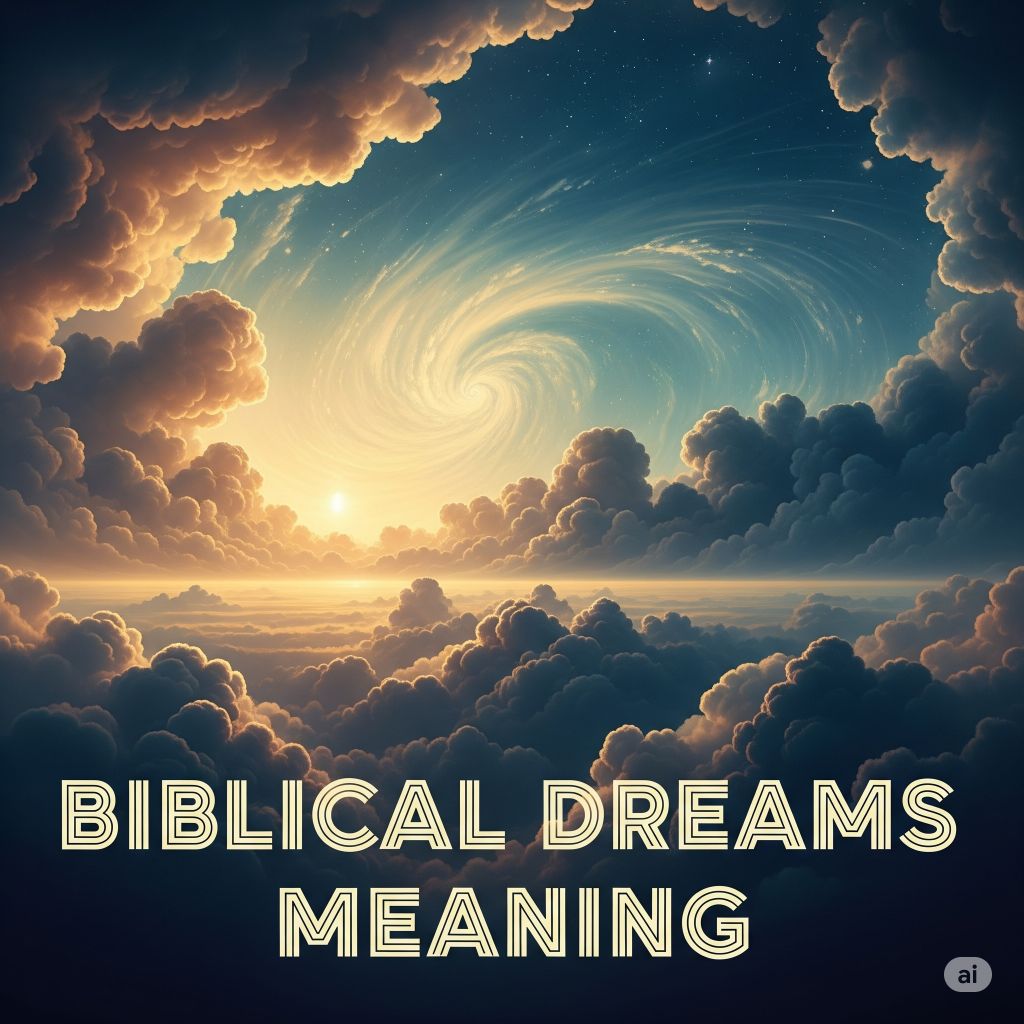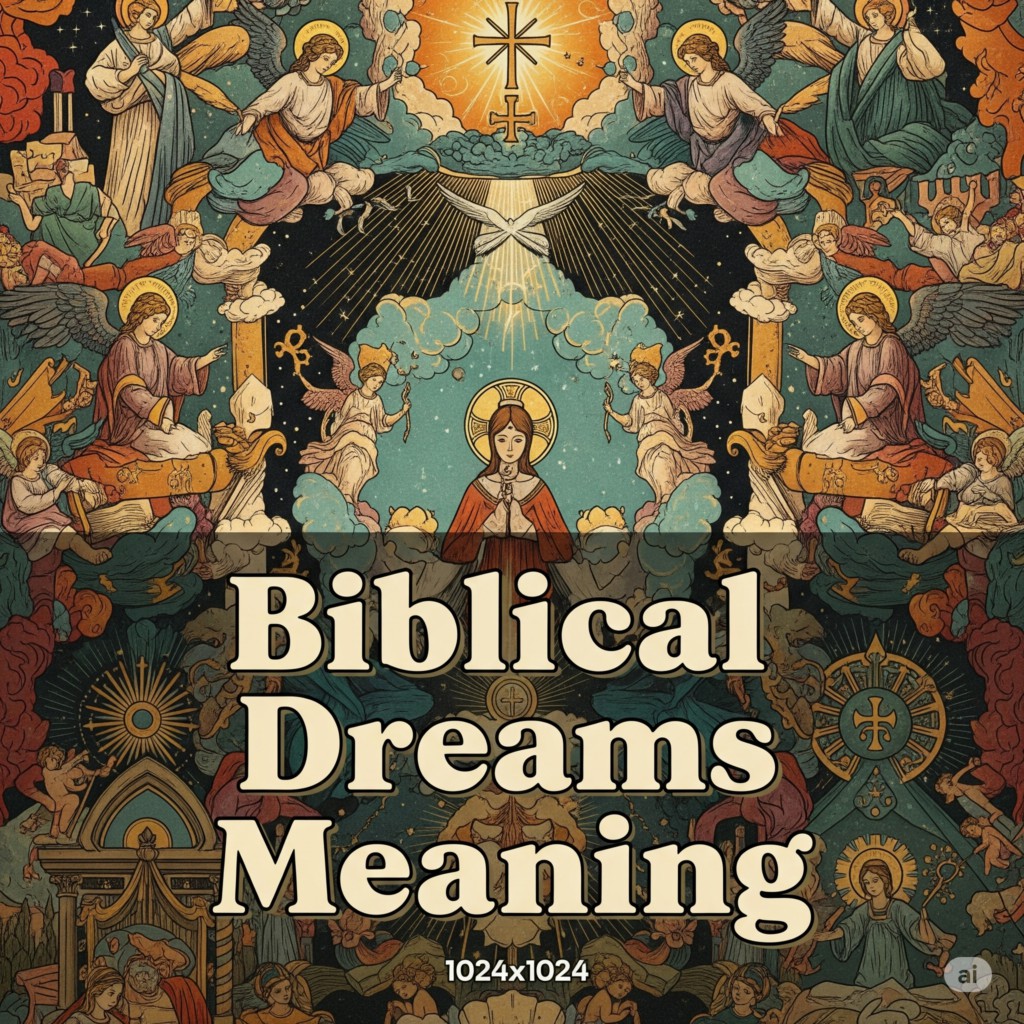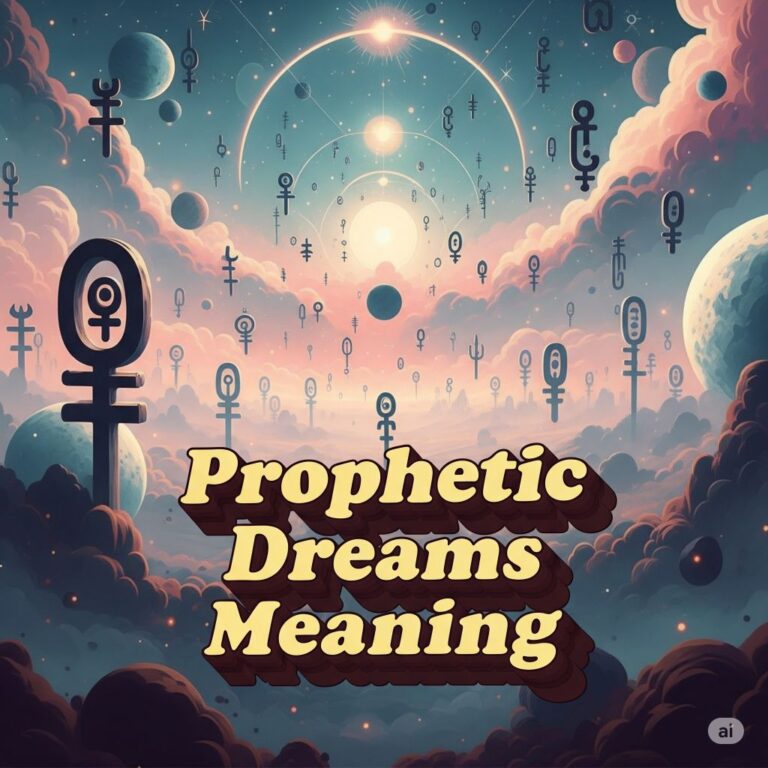
Dreams have long been regarded as significant phenomena in various cultures, especially within the context of religious and spiritual traditions. In the Bible, dreams take on a profound role as vehicles for divine communication and revelation. Throughout the scriptures, dreams serve as pivotal moments of guidance, prophecy, warning, and insight, reinforcing the belief that dreams can carry messages from God or provide insight into divine plans.
This article explores the meanings and interpretations of biblical dreams, their significance within the biblical narrative, examples of notable dreams from the scriptures, and how they are understood in both historical and contemporary contexts.
Meaning of Biblical Dreams
Biblical dreams can be classified into various categories based on their purpose and content:
- Prophetic Dreams: Dreams that foretell future events or convey God’s intentions (e.g., Joseph’s dreams).
- Warning Dreams: Dreams meant to alert individuals about danger or sinful behavior (e.g., dreams given to Pilate’s wife).
- Guidance Dreams: Dreams that provide direction or clarity in decision-making (e.g., the dreams of Mary’s husband, Joseph).
- Symbolic Dreams: Dreams that communicate deeper meanings through symbols (e.g., Daniel’s interpretations).
Key Characteristics
- Divine Source: Dreams are often regarded as messages from God or divine beings.
- Symbolism: Many biblical dreams utilize rich symbols and metaphors that require interpretation.
- Clarity of Purpose: Dreams often have a clear moral or spiritual lesson.
- Cultural Context: Understanding dreams involves recognizing the historical and cultural backdrop of biblical times.
Examples of Notable Biblical Dreams
Several key examples from the Bible illustrate the importance and function of dreams in the biblical narrative:
1. Joseph’s Dreams (Genesis 37:5-10)
- Description: Joseph dreams that he and his brothers are binding sheaves of wheat in the field, and his sheaf rises above the others, representing his future leadership. He also dreams of the sun, moon, and eleven stars bowing down to him, which symbolizes his family’s eventual subservience to him.
- Significance: These dreams foreshadow Joseph’s rise to power in Egypt and the eventual estrangement and reconciliation with his brothers. They highlight themes of ambition, divine purpose, and family dynamics.
2. Pharaoh’s Dreams (Genesis 41:1-30)
- Description: Pharaoh dreams of seven fat cows being devoured by seven lean cows and seven good ears of grain being swallowed by seven blighted ears.
- Interpretation: Joseph interprets the dreams to mean that Egypt will experience seven years of abundance followed by seven years of famine.
- Significance: This dream emphasizes the importance of preparation and foresight, as well as Joseph’s role as a divinely inspired interpreter, leading to his rise in Pharaoh’s court.
3. Nebuchadnezzar’s Dream (Daniel 2)
- Description: King Nebuchadnezzar dreams of a great statue made of various materials (gold, silver, bronze, iron, and clay), which is struck by a stone and shatters.
- Interpretation: Daniel interprets the statue as representing various kingdoms that will rise and fall, culminating in a divine kingdom that will last forever.
- Significance: This dream conveys divine sovereignty over earthly kingdoms and highlights the transitions between power and authority throughout history.
4. Daniel’s Own Dream (Daniel 7)
- Description: Daniel dreams of four great beasts rising from the sea, each representing a different kingdom, followed by the vision of the Ancient of Days (God) presiding in judgment.
- Interpretation: The dream symbolizes God’s ultimate authority and the eventual triumph of His everlasting kingdom.
- Significance: It serves as a message of hope and assurance for those enduring political oppression, stressing the eventual establishment of divine justice.
5. Solomon’s Dream (1 Kings 3:5-14)
- Description: God appears to Solomon in a dream at Gibeon and asks what he desires. Solomon requests wisdom to govern the people effectively.
- Significance: This dream signifies the importance of wisdom over wealth and power, establishing Solomon’s reputation as a wise ruler. It emphasizes the theme of divine favor and responsibility in leadership.
6. Joseph’s Dream (Matthew 1:20-25)
- Description: An angel appears to Joseph in a dream, instructing him not to fear taking Mary as his wife, explaining that the child conceived in her is from the Holy Spirit.
- Significance: This dream illustrates the divine guidance provided to Joseph during a critical moment in the nativity narrative, emphasizing themes of faith, trust, and divine intervention.
7. Pilate’s Wife’s Dream (Matthew 27:19)
- Description: While Pilate is presiding over the trial of Jesus, his wife sends him a message, stating, “Have nothing to do with that just man; for I have suffered many things in a dream because of him.”
- Significance: This dream serves as a divinely inspired warning, highlighting the moral conflict Pilate faces. It emphasizes the theme of prophetic dreams and the importance of discernment.
8. Ezekiel’s Vision (Ezekiel 1)
- Description: Ezekiel has a vivid vision of four living creatures, each with faces of a man, lion, ox, and eagle, alongside wheels within wheels, and the glory of the Lord.
- Significance: This dream symbolizes God’s sovereignty and glory, reflecting divine judgment and a call to prophetic ministry. It showcases a powerful encounter with the divine.
9. Jacob’s Dream (Genesis 28:10-17)
- Description: Jacob dreams of a ladder set up on the earth, reaching to heaven, with angels ascending and descending on it. God stands above it and reaffirms His covenant with Jacob.
- Interpretation: This dream symbolizes the connection between heaven and earth and serves as a reassurance of God’s presence and promises. The ladder represents the link between the divine and humanity.
- Significance: This encounter marks a pivotal moment in Jacob’s life, reinforcing the covenantal relationship with God and establishing him as a patriarch.
10. Joseph’s Dreams (Genesis 40)
- Description: While imprisoned in Egypt, Joseph interprets the dreams of Pharaoh’s cupbearer and baker. The cupbearer dreams of vines with three branches that bear grapes, while the baker dreams of three white baskets on his head with baked goods.
- Interpretation: Joseph accurately predicts that the cupbearer will be reinstated in Pharaoh’s service, while the baker will be executed.
- Significance: This episode highlights Joseph’s prophetic gift and foreshadows his eventual rise to power in Egypt, showcasing how divine influence operates through dreams.
11. The Dream of the Magi (Matthew 2:12)
- Description: After visiting the infant Jesus, the Wise Men from the East receive a warning in a dream not to return to Herod, so they take another route home.
- Interpretation: This dream serves as a divine intervention, preventing Herod from discovering the location of the child and protecting Jesus from impending danger.
- Significance: This event emphasizes the role of dreams in divine protection and the importance of heeding spiritual guidance.
12. Daniel’s Vision of the Ram and the Goat (Daniel 8)
- Description: Daniel dreams of a ram with two horns and a goat with a prominent horn. The ram represents the Medes and Persians, while the goat symbolizes Greece, with the prominent horn indicating Alexander the Great.
- Interpretation: This dream is prophetic, predicting the rise and fall of empires, thereby illustrating the theme of divine sovereignty over human history.
- Significance: The vision reassures the Jewish people that despite oppression, God governs the course of history.
13. Ananias’ Dream (Acts 9:10-16)
- Description: In a vision, the Lord instructs Ananias to go to Saul (later Paul) and restore his sight after Saul’s conversion experience on the road to Damascus.
- Interpretation: The dream reflects divine will and guidance, revealing God’s purpose in choosing Paul as an instrument for spreading the gospel.
- Significance: Ananias’s willingness to follow God’s instruction, despite his fears about Saul, exemplifies faith and obedience that facilitates a critical moment in early Christianity.
14. Job’s Dream (Job 33:14-18)
- Description: Elihu speaks of dreams as a method by which God communicates with people, saying, “For God speaks in one way, and in another, though man does not perceive it.”
- Interpretation: This verse implies that dreams may convey divine messages, warnings, or guidance.
- Significance: The discussion of dreams in the context of Job’s suffering highlights the importance of recognizing divine intervention and seeking understanding during trials.
15. The Vision of Ezekiel (Ezekiel 37:1-14)
- Description: Ezekiel is taken to a valley of dry bones, which are commanded to rise and breathe. The bones come together, and a spirit is breathed into them, turning them into a living army.
- Interpretation: This vision signifies the restoration of Israel, symbolizing hope and renewal after exile and despair.
- Significance: It serves as a powerful metaphor for resurrection and spiritual revival, emphasizing God’s promise of bringing life to what was once desolate.
16. Peter’s Vision (Acts 10:9-16)
- Description: Peter experiences a vision of a sheet filled with unclean animals and hears a voice telling him to kill and eat. This vision symbolizes the opening of the gospel to Gentiles.
- Interpretation: The dream illustrates God’s radical inclusivity, challenging traditional Jewish dietary laws and emphasizing the universality of salvation.
- Significance: Peter’s vision represents a pivotal moment in Christianity, marking the acceptance of non-Jews into the faith.
17. The Dream of the Rich Fool (Luke 12:16-21)
- Description: In this parable, a rich man dreams of building larger barns to store his grain, only to learn that his life will be demanded of him that very night.
- Interpretation: This story serves as a reminder about the folly of prioritizing material wealth over spiritual wealth and the unpredictability of life.
- Significance: It emphasizes the importance of spiritual readiness and the transient nature of earthly possessions.
Collecting and Analyzing Symbols in Biblical Dreams
Understanding the symbolism in biblical dreams is crucial for interpreting their meanings accurately. Several common biblical symbols recurred in dreams, each with specific implications:
| Symbol | Meaning | Examples of Usage |
|---|---|---|
| Animals | Represent characteristics or roles (e.g., lions for power, sheep for innocence) | Joseph’s interpretation of Pharaoh’s cows |
| Light | Indicates divine presence, guidance, or truth | God’s light in dreams (e.g., Moses’ experiences) |
| Water | Signifies chaos, life, purification, judgment | Used symbolically in prophetic dreams |
| Numbers | Hold specific meanings (e.g., 7 for completeness; 12 for tribes) | Significant in Joseph’s and Daniel’s dreams |
| Weapons | Power, conflict, protection | Represents struggles in dreams of trials |
Interpretations of Biblical Dreams
1. Historical Context
Understanding the cultural and historical backdrop is essential for interpreting biblical dreams. Dreaming was prevalent in ancient Near Eastern cultures, and divine messages delivered through dreams were commonplace beliefs. Dreamers often held significant social or religious standing as prophets or intermediaries between the divine and human realms.
2. Symbolism and Analysis
Biblical dreams often use symbolic representations known to the dreamer:
- Animals: Symbolize characteristics (e.g., lions for strength, sheep for innocence).
- Natural Elements: Water can indicate chaos or life, while fire may symbolize purification or judgment.
- Numbers: Certain numbers hold significance (e.g., seven often represents completion or perfection in biblical texts).
3. Purpose and Meaning
Biblical dreams serve various spiritual, moral, and prophetic purposes. They may:

- Convey warnings about dangers or consequences of actions.
- Provide guidance during critical life decisions.
- Affirm divine plans and encourage faith during challenging times.
- Foster deeper self-understanding or spiritual awakening.
Spiritual and Religious Perspectives
In biblical contexts, dreams are often seen as direct communication from God or as manifestations of spiritual truths that guide individuals toward their destinies and greater moral righteousness.
1. Divine Communication
Many biblical figures interpret dreams as divine messages. The interpretation reveals God’s plan and often leads to actions that align individuals with their purpose.
2. Prophetic Tradition
Dreams are closely linked to the prophetic tradition in the Bible, where prophets receive revelations through dreams to guide or warn communities. This connection emphasizes the importance of attentiveness to dreams as potential messages from God.
3. Ethical Framework
Biblical interpretation encourages individuals to consider the moral implications of their dreams and to act in accordance with the wisdom and insights gleaned from them.
Example: Joseph’s response to his dreams serves as a cautionary tale about jealousy and ambition, while Solomon’s dream champions humility and wisdom.
Cultural Interpretations of Dreams
Dream interpretation varies across cultures but shares common threads:
1. Ancient Civilizations
- Dreams as Omens: In many ancient cultures, dreams were viewed as omens or messages from the divine, frequently interpreted by priests or shamans.
2. Modern Perspectives
- Therapeutic Approaches: Contemporary psychology views dreams, including biblical ones, as a means of processing emotions and experiences.
3. Cross-Cultural Themes
- Universally, themes of travel, transformation, conflict, and divine communication appear in dreams, reflecting shared human experiences.
Common Symbols in Biblical Dreams
| Symbol | Interpretation |
|---|---|
| Cows | Abundance or lack; can represent prosperity or famine (as in Pharaoh’s dreams) |
| Stars | Hope, destiny, guidance, often linked to divine promises |
| Water | Chaos, life, spiritual cleansing, or judgment |
| Fire | Purification, divine presence, or destruction |
| Animals | Specific traits (e.g., birds as messengers, lions as kings) |
| Numbers | Symbolic meanings based on significance (e.g., seven days of creation) |
Working with Biblical Dreams
1. Dream Journaling
Keep a journal to record your dreams immediately upon waking, focusing on symbols and emotions.
2. Seek Interpretation
Consider discussing your dreams with knowledgeable individuals, such as spiritual leaders or experienced interpreters in your faith tradition.
3. Reflect on Personal Context
Examine how dream symbols relate to your waking life, values, struggles, and spiritual journey.
4. Prayer and Meditation
Recovering focus through prayer or meditation on your dreams may help illuminate their meanings.
Notable Real-World Reports
Numerous individuals claim to have experienced profound guidance or inspiration believed to stem from dreams. Some notable accounts include:
- Historical Figures: Dream reports by notable figures like Abraham Lincoln, who is said to have dreamed of foreboding events surrounding his presidency.
- Modern Witnesses: Individuals in various religious communities have shared personal experiences where dreams directed them toward actions that were transformative or life-changing.
Conclusion
Biblical dreams reflect the intersection of the subconscious with divine communication, offering insights, guidance, and reflections on human experience. They highlight the significance of introspection, the value of being open to messages beyond the waking state, and the potential for dreams to play a role in personal and spiritual growth.
Every dream carries meaning—whether in the pages of ancient scripture or in the quiet hours of the night. By engaging with biblical dreams, we can unlock valuable lessons and deepen our understanding of ourselves and our connection to the world around us. If you have questions about interpreting specific dreams or want to explore how they may relate to your spiritual life, feel free to seek guidance!






